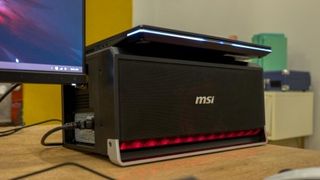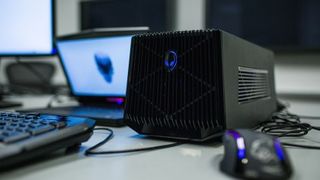Maxing out graphics
Processors aren't the only desktop part coming to laptops. Both MSI and Alienware have created GPU boxes that allow you to connect a full-size graphics card to a laptop for the full-on desktop gaming experience.

So far the concept has proven sound from our time with the MSI GS30 Shadow with GamingDock. As we discovered during the course of our GS30 Shadow review, pairing the Intel Core i7-powered laptop with a high-end GPU gave us as much performance throughput as a desktop rig.
The only problem is MSI's system requires users to fully shut down their gaming laptop as well as use an external monitor, keyboard and mouse, all of which turns it into more of a dockable desktop. Alienware, on the other hand, has created a much more flexible system with its Graphics Amplifier, which allows users to push the extra performance from the desktop graphics card directly into the laptop and its built-in display.
As Joe Olmsted, director, Alienware products, told TechRadar, "[Alienware's] goal was to give [their] customer the full functionally of their notebooks." This includes using the notebook's LCD screen, keyboard, touch pad and ports while offering even more expandability through the GPU's own external video ports.

Olmsted explained Alienware wanted to produce a solution that helps gamers drive the QHD and 4K screens found on its larger-than-life gaming laptops, such as the Alienware 17. More importantly, it's a solution that will allow users to extend the life of their mobile gaming rig.
"I personally would want the fastest GPU I could afford and be able to put in virtually any card that comes in the future," Olmsted quipped. As it stands, the Alienware Graphics Amplifier comes with two 375-watt slot cards, which should take anything except the single highest-end card AMD card or the Nvidia Titan Z.
"If my friend just upgraded his gaming desktop to a Nvidia GTX 980 card and gave me his 780 Ti, it would be nice to kick the performance of that Alienware M17x up a notch," he said, giving an example of what the Graphics Amplifier can do for users. Olmstead wasn't ready to say a desktop graphics bump could extend the life of a gaming notebook by three years, but it could help customers get off the cycle of upgrading their notebooks so quickly.
Get daily insight, inspiration and deals in your inbox
Get the hottest deals available in your inbox plus news, reviews, opinion, analysis and more from the TechRadar team.
The long road to mainstream
Of course, there are some downsides to having easily upgradable components. For starters, a soldered connection will always be thinner than any socketed plug or circuit linking together over a bridge. It's for this reason MXM cards and desktop CPUs are reserved to thicker gaming machines such as Origin's EON17-X and EON15-X.

These are also upgrades you won't likely see on Ultrabooks or anything less than a gaming machine that stands on the bleeding edge of performance. That said, the here and now is an extremely exciting time for those who already own or are interested in investing in a gaming laptop. Mobile and desktop components have never been closer in performance and it's a trend that will likely only continue in the near term.
Beyond gaming laptops, notebooks have generally become thinner rather than modular. Take the MacBook Air - it's is stunningly slim, measuring 0.68 inch (170 mm) thick, but at the cost of irremovable components, including memory that's fixed to a logic board.
However, experiments like Project Ara have shown smartphones can be modular, which then inspired notebook maker One Laptop Per Child to start designing a hybrid-device of its own. Larger manufacturers have yet to express interest in making upgradable laptops, but for now gamers may have a glimpse of the future.
- The gaming hardware arms race is a boon for the PC gaming renaissance
Kevin Lee was a former computing reporter at TechRadar. Kevin is now the SEO Updates Editor at IGN based in New York. He handles all of the best of tech buying guides while also dipping his hand in the entertainment and games evergreen content. Kevin has over eight years of experience in the tech and games publications with previous bylines at Polygon, PC World, and more. Outside of work, Kevin is major movie buff of cult and bad films. He also regularly plays flight & space sim and racing games. IRL he's a fan of archery, axe throwing, and board games.
Most Popular


